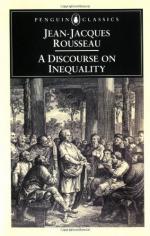
|
| Name: _________________________ | Period: ___________________ |
This quiz consists of 5 multiple choice and 5 short answer questions through Chapter 1, A Discourse on the Moral Effects of the Arts and Sciences, Part I.
Multiple Choice Questions
1. According to Rousseau, what led to the degeneration of society?
(a) The progress of talent.
(b) The progress of art.
(c) The establishment of talent.
(d) The establishment of beauty.
2. What does Rousseau consider to see if the contradiction he found was true?
(a) The wealth of the state.
(b) The government.
(c) The church.
(d) The arts and sciences.
3. Why does Rousseau believe the arts and sciences are responsible for the fall and collapse of human's morality?
(a) The improve well roundedness.
(b) They corrupt human thought.
(c) They corrupt human importance.
(d) They negate human reason.
4. According to Rousseau, in the revival, the arts and sciences existed under what entities?
(a) Power and religion.
(b) Reason and religion.
(c) Government and the law.
(d) Reason.
5. What does Rousseau's "Chapter 1, A Discourse on the Moral Effects of the Arts and Sciences, Part I" discuss about the correlation between the restoration of the arts and sciences and morality?
(a) If morality purifies science.
(b) How morality and corruption affect one another.
(c) If corruption negates artistic quality.
(d) If morality is purified or corrupted by arts and science.
Short Answer Questions
1. What can only be brought about by ignorance given its results according to Rousseau?
2. Why does Rousseau think men lie under restraint?
3. What should mans' response to the effects of art and science on society be, as described by Rousseau?
4. What makes motives hard to discern in the modern age, according to Rousseau?
5. According to Rousseau, what ancient thinker praised ignorance?
|
This section contains 299 words (approx. 1 page at 300 words per page) |

|




